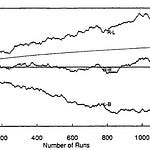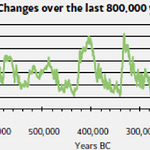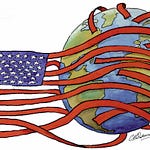It was never easy to question the election machines or the electronic systems that tally our votes, but now it has become much harder. Dominion Voting Machines has sued Fox News Network on the grounds that they were not sufficiently skeptical of Rudolph Giuliani and Sidney Powell when the latter claimed they had evidence that the 2020 election had been stolen from their client, Donald Trump. A judge handed down a partial summary judgment for the plaintiff, and Fox has settled for more than ¾ of a billion dollars — an amount far greater than the total dollar value of Dominion’s sales over its entire history.
From this time forward, the derisive moniker “Trumpster” is attached to anyone who questions computerized voting, added to the time-worn “conspiracy theorist”. Worse, there is a risk of financial ruin to any mainstream outlet that publishes on the subject.
I first became involved in the Election Integrity movement in November, 2004. A handful of activists online exchanged evidence that the Presidential election had been rigged, in Ohio and elsewhere, for G W Bush over John Kerry. I was teaching a statistics course at the time, and proud to crunch numbers for the group. We all thought this was big news, and the New York Times would gobble it up.
The Times didn’t gobble. The Times didn’t ignore us. They created a hit piece and dismissed our concerns without ever talking to me (as statistician) or to the lawyers, scientists, and professors who spoke for our nascent movement.
Gradually, over the ensuing years, we came to realize that the press wouldn’t come near our issue, that the DNC didn’t want to talk to us, and the Democratic think tanks inside the Beltway were taking their cues from the party. We watched as one election after another showed surprising departures from exit polls, almost always Republicans doing better than expected.
Perhaps this story is news to you — after all, as I say, it has not been widely reported. In 2016 I published a four-part series at OpEdNews summarizing what I knew about electronic corruption of American elections [One, Two, Three, Four].
2016 followed a pattern we knew well. It seemed that operators on behalf of Trump stole just enough votes to squeak by Hillary Clinton in the electoral college.
But 2020 was a surprise to all of us. We learned that Trump was not an ordinary Republican. He was not a team player, and the usual oligarchs and plutocrats couldn’t count on him to stay in line. They wanted him out.
Was the 2020 election stolen from Trump? Our movement doesn’t have an answer. Our forensic methods rely on exit polls, but exit polls were worthless in 2020 because more than half the voters voted by mail, and the election day voters were skewed toward Republicans, because Democrats tended to be more spooked by COVID, more likely to vote in advance. Telephone polls did not indicate a consistent disparity, but they are less reliable than exit polls. Also because of COVID, the tabulation process was even more hidden from public supervision than previously. Widespread use of mail-in ballots created new opportunities for corruption, while delayed scanning of mail-in ballots aroused suspicions.
When elections were stolen from Gore (2000) and Kerry (2004), they sat down and kept their mouths shut. When Bernie was cheated out of the 2016 Democratic nomination, he kept mum and threw his support to Hillary; and, of course, when a few months later Hillary lost to The Donald under questionable circumstances, she was in no position to make a fuss. All of these people knew exactly what had happened (there are different sources for this in each case), so the silence of all these victims was deliberate.
But shutting up was never Trump’s strong suit. So, after 2020, we had loud allegations of a stolen election. During all those years when the Democrats had strong claims that they had been cheated, they chose silence, but with far weaker evidence, Trump was not shy about crying foul.
My movement — a few hundred people around the country who follow Election Integrity and make a study of it — my movement was deeply split over the 2020 election. I was with the minority, who welcomed the call from Giuliani and Powell to examine the election process more closely. We, the minority, feel that opening the black box is necessary if we are ever to have honest elections. We’re willing to take the short-term risk that Trump may benefit from the process in this case in order to have more transparency in the long term. The majority of our members are staying silent about the 2020 election, or even citing evidence to refute Giuliani and Powell. I think they believe that the weakness of Trump’s case creates a bad precedent if Giuliani argues for close scrutiny and then the scrutiny turns up no foul play. But some are also open about not wanting to offer their influence and reputations in a cause that might benefit Trump.
Dominion vs Fox
This is the context for Dominion’s defamation lawsuit against Fox News. In the weeks after the 2020 election, Fox gave Giuliani a platform to make his charges that he had evidence in his back pocket that would overturn the election. Some of his complaints were about the software company, Dominion. In March, 2021, Dominion sued Fox for defamation.
Dominion is a relatively new name in the field of voting machines. Perhaps you are familiar with the three giants from previous years, Diebold, Sequoia, and ES&S. Diebold and Sequoia were swallowed by Dominion, and ES&S remains an independent competitor, though Dominion acquired some of their intellectual property. Dominion was taken private in 2018.
Defamation lawsuits are hard to win. The plaintiff has to prove (#1) that the defendant made false statements, (#2) that defendant knew they were false, and (#3) that plaintiff lost money because of defendant’s statements.
The case against Fox was unusual in that almost all the objectionable statements were made not by Fox broadcasters but by Giuliani and Powell, who were interviewed on air. If you care about my opinion, my opinion is that a news network has a right, probably an obligation, to give the President’s lawyer an airing, whether or not the President’s lawyer is telling the truth. Sometimes the Fox interviewers challenged Giuliani and Powell to produce evidence, sometimes they seemed swept away by the audacity of their charges.
Dominion’s case against Fox is based largely on their claim that Fox “omitted a context for the content”, and thereby left viewers with the impression that Giuliani’s claims were more credible than they really were.
Personally, I find it mystifying that Giuliani and Powell puffed so boldly about all the affidavits and the physical evidence that they had in their back pocket. They folded their tent completely a few days later. Was it all bluff and bluster? Or did they actually have some evidence and they were reined in, one way or another, by the powers that really control our elections?
January 6, I think, is no parenthesis
In my opinion, the reporting on January 6 has been part of the propaganda campaign to discredit anyone who questions America’s election machinery. The word “insurrection” is absurdly inappropriate. People who were invited as speakers and journalists filming the event have been jailed and intimidated. Habeas corpus has been denied to hundreds of people who were guilty, at worst, of a misdemeanor.
I know people who were in the Capitol on January 6, and based on what I’ve heard and read, I believe that January 6 was a mostly peaceful demonstration, and the disorderly behavior was instigated by agents provocateurs from the FBI.
For years, my people in the Election Integrity movement have been asking, when will the public get out in the street and demand an honest vote count? On January 6, we got what we wished for, but most of my colleagues in Election Integrity wanted nothing to do with the protestors.
The summary judgment order
Before a trial begins, it is customary for both sides to ask the judge to rule in their favor — no trial necessary. This is called a “summary judgment motion” and the threshold for summary judgments is a high bar. The judge will rule summarily for the defendant if he finds that, even if everything the plaintiff claims is true, there is still no case that can be made against the defendant. Much more rarely, the judge will rule summarily for the plaintiff if he finds that there are no relevant facts in dispute and all the claims made in defendant’s pleadings are judged to be an insufficient defense.
The judge is not permitted to base his summary decision on disputed facts; if facts are in dispute, then the case must go to trial. Either side has a right to ask for a jury.
In this case, the judge made a partial summary judgment ruling in favor of the plaintiff. He ruled that plaintiff’s burden of proof #1 had been satisfied — that Fox had indeed made false statements. How could he presume to know this? In the decision, he seems to have conflated #1 with #2. #1 means that the claims were false; #2 means that the defendant believed them to be false. The judge cites internal memos in which Fox expresses doubts about what Giuliani and Powell are saying. Logically, it is possible that the claims were true but that the defendant believed them to be false. The judge did not seem to consider this possibility. Nor did he account for the obvious: that reporters and different managers within Fox had different opinions about the veracity of Giuliani’s claims. I dare say that the decision to give Giuliani a platform was based on a combination of factors, including his inherent newsworthiness as the President’s lawyer and the red meat that draws viewers to Fox News.
The settlement
Last week’s news was that Fox settled Dominion’s claim without a court hearing. I can understand that Fox was shy about going to trial after the judge’s Summary Judgment order signaled that he was sympathetic to the plaintiff’s case. But in court, Dominion’s first burden of proof would be that the election was not stolen — something I claim is impossible to know, given the lack of paper trails and statistical evidence. Dominion would also have to prove that Fox knew at the time that the election was not stolen. And then Dominion would have to establish the amount of their damages.
How much revenue did Fox’s broadcasts cost Dominion? This is a question that a jury would be asked to decide. The amount of the settlement, $787 million, represents 45 times the revenue in their peak year. Dominion would have to prove not just lost revenue, but lost profit. Because Dominion is privately held, its profit figures are not public knowledge, but even if their profit margin is as high as 50%, it means that Dominion would have to prove that they lost 90 years’ worth of profit because of Fox’s broadcasts.
It doesn’t make sense to me that Fox was afraid that if they didn’t settle for $787 million, then a jury might find damages greater than this. Something else is going on. Does Fox have secrets that they did not want to come out in a court proceeding? Did they fear adverse publicity that would affect their ratings? Or were they being pressured by the same forces that have stifled the Election Integrity movement over the years?
This week, Fox News fired Tucker Carlson, who had attracted their biggest audiences, and was still growing in his reach. Carlson is quoted in the Summary Judgment Order as having broadcast on the subject of the putatively stolen election, but he was far less involved than Lou Dobbs and Maria Bartiromo. Dobbs and Bartiromo were not fired. My guess is that Carlson has stepped out of the party line once too often, interviewing Democrats RFK Jr and Tulsi Gabbard, COVID dissidents Dr Peter McCullough and Dr Simone Gold, and Pfizer-slayer Ed Dowd.
The Future
My reading is that this is the final nail in the coffin of the Election Integrity movement. No matter how unexpected the results, no matter how opaque the vote tallying process, no one will ever again dare to question the reported results of an American election.
For historical context of vote theft in America, read Vote Scam, by James and Kenneth Collier.
For a blow-by-blow account of vote theft in the 21st century, read Code Red by Jonathan Simon.












Share this post